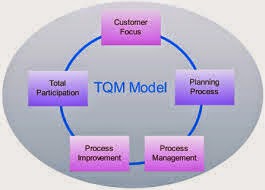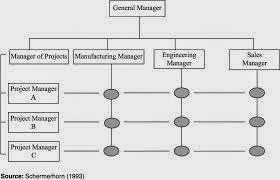TOTAL QUALITY MANAGEMENT (TQM)
Total quality control
refers the control on quality of manpower; quality of machines and quality
management; and factors associated for managing them is called TQM. It has two
fundamental operational goals. They are as follows.
(a)
Careful design of product & service
(b)
Ensures that organization's system can consistently produce the
product and design or not.
In this regard we can
define TQM as managing the entire organizations' effort so that it excels in
all dimension of product and services that are important to customers.TQM is a
necessity. It is a journey which will never end. It is way to survive and
succeed. TQM is a totality integrated effort for gaining competitive advantage
by continuously improving every steps of operation.
Philosophical element
of TQM
The philosophical
element of TQM stresses the operation of the firm using quality as the
integrating element. Some elements are:
1. Customer-focused.
The customer ultimately determines the level
of quality. No matter what an organization does to foster quality
improvement—training employees, integrating quality into the design process,
upgrading computers or software, or buying new measuring tools—the customer
determines whether the efforts were worthwhile.
2. Total employee involvement
All employees participate in working toward
common goals. Total employee commitment can only be obtained after fear has
been driven from the workplace, when empowerment has occurred, and management
has provided the proper environment. High-performance work systems integrate
continuous improvement efforts with normal business operations. Self-managed
work teams are one form of empowerment.
3. Process-centered.
A fundamental part of TQM is a focus on
process thinking. A process is a series of steps that take inputs from
suppliers (internal or external) and transforms them into outputs that are
delivered to customers (again, either internal or external). The steps required
to carry out the process are defined, and performance measures are continuously
monitored in order to detect unexpected variation.
4. Integrated system.
Although an organization may consist of many
different functional specialties often organized into vertically structured
departments, it is the horizontal processes interconnecting these functions
that are the focus of TQM.
5. Strategic and systematic approach.
A critical part of the
management of quality is the strategic and systematic approach to achieving an
organization’s vision, mission, and goals. This process, called strategic
planning or strategic management, includes the formulation of a strategic plan
that integrates quality as a core component.
6. Continual improvement
A major thrust of TQM is continual process
improvement. Continual improvement drives an organization to be both analytical
and creative in finding ways to become more competitive and more effective at
meeting stakeholder expectations.
7. Fact-based decision making
In order to know how well an organization is
performing, data on performance measures are necessary. TQM requires that an
organization continually collect and analyze data in order to improve decision
making accuracy, achieve consensus, and allow prediction based on past history.
8. Communications
During times of organizational change, as well
as part of day-to-day operation, effective communications plays a large part in
maintaining morale and in motivating employees at all levels. Communications
involve strategies, method, and timeliness.
These elements are
considered so essential to TQM that many organizations define them, in some
format, as a set of core values and principles on which the organization is to
operate.



Comments